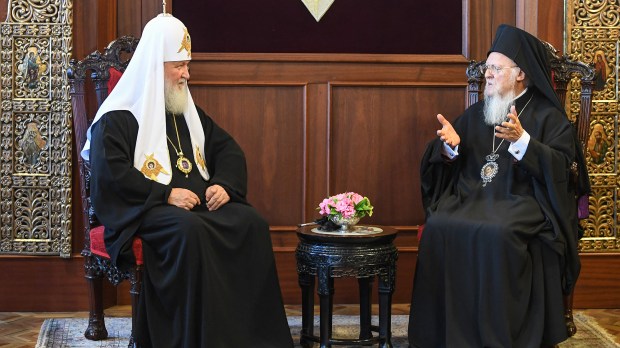Monday 21 March 2022
1- The unity of the Orthodox Church is cracking
2- In France, Catholics seems to swing to the right
3- The Anglo-Saxon recipe adopted by the Vatican to fight financial scandals
4- Meet Pope Francis, the traditionalist
5- Does the Apostolic Constitution transform the Curia into the Society of Jesus?
~
With more than 500 signatures from numerous intellectuals and theologians, including some prominent Russian Orthodox Christians, a statement published by the Center for Orthodox Christian Studies at Fordham University in New York attacks Kirill’s position since the beginning of the war. As reported in the French weekly La Vie, Kirill is accused of “justifying” the invasion and the horrors committed in Ukraine in the name of a “heresy,” the concept of a “Russian world.” This unites a spiritual “russianity” with political Russia, giving President Putin the weapons to justify his crusade in Ukraine. “Just as Russia has invaded Ukraine, the Moscow Patriarchate of Patriarch Kirill has invaded the Orthodox Church,” the intellectuals reproach, indignant at the creation of division and the endangering of “the salvation of the faithful.” One of the signatories, Sergei Chapnin, former deputy editor-in-chief of the Journal of the Moscow Patriarchate, considers that Patriarch Kirill has “lost his authority” and evokes a split within Russian Orthodoxy between an official Church “ready to forget the Gospel and justify war crimes” and a Church “that seeks to live according to the commandments of Christ.” Before concluding: “these two Churches cannot continue to exist under the same roof.”
La Vie, French
2In France, Catholics seems to swing to the right
In France, with only three weeks to go before the first round of elections for the next President of the Republic, Catholics have the opportunity to tip the balance to one camp or the other. The German newspaper Die Tagespost offers an analysis of the French political situation in the run-up to the presidential elections. In a political battle where the current president, Emmanuel Macron, is all but certain to make it to the second round, his three main opponents – Valérie Pécresse, Marine Le Pen and Eric Zemmour – are fighting hard to get the Catholic vote. According to a political scientist quoted in the article, Eric Zemmour “is taking advantage of the fact that the right-wing electorates are no longer strictly delimited.” He has also benefited greatly from the rallying of Marion Maréchal Le Pen, niece of Marine le Pen, to his party, who has noted the incompatibilities of the Rassemblement National with the Catholic vote. Finally, although he is described as “divisive,” it is nevertheless “someone like Zemmour who is committed to recognizing the Christian roots of French civilization” that “obviously attracts believers.”
Die Tagespost, German
3The Anglo-Saxon recipe adopted by the Vatican to fight financial scandals
In an article published in the French news outlet Le Monde, a lawyer explains that the Vatican has adopted “Anglo-Saxon business compliance” to resolve the various scandals that affect the Church’s reputation. This “compliance” advocates for organizational methods of anticipation where the management of risk rests principally on the operator rather than on its controller. The lawyer points out that even if the Vatican “has always appeared to be at the antipodes of this culture,” notably because of the philosophy of punishment stemming from canon law “which is more penitential than penal,” all the legislative and judicial measures in the area of finance taken by Benedict XVI and Francis these last few years go in this direction. It is a question of carrying out “a total overhaul of the Vatican and the Church,” which is too tainted, analyses the author. For the professor of business law, the Sauvé report is also based on the same paradigm. By identifying a “structural responsibility,” the report on pedocriminality espouses the whole philosophy of compliance, writes the jurist.
Le Monde , French
4Meet Pope Francis, the traditionalist
Vatican expert John Allen argues in Crux that, despite all the ways in which Pope Francis has been seen as a revolutionary in the Church, his decision to consecrate Russia and Ukraine to the Immaculate Heart of Mary is a reminder of the certain areas in which the Latin American pontiff is very traditional in his own way. Allen argues that Francis’ “closet traditionalism” can be best seen in his approach to the Virgin Mary. He says that “hard-core Fatima devotees” have little to object in this consecration and importantly the Russian Orthodox Church will surely not miss “the significance of the pontiff dusting off the most ferociously hawkish and anti-Russian devotion of the Cold War in the context of Vladimir Putin’s scorched-earth war in Ukraine.” Allen concludes that despite the stereotypes surrounding “traditionalism” and “traditionalists,” “‘Tradition,’ […] is still a many-splendored thing – and, at least by his own lights, Pope Francis turns out to be remarkably traditional himself.”
Crux, English
5Does the Apostolic Constitution transform the Curia into the Society of Jesus?
Vatican journalist Maria Antonietta Calabrò comments on Pope Francis’ newly published Apostolic Constitution, “Praedicate Evangelium,” reforming the structure of the Roman Curia, by drawing comparisons with the organization of the Society of Jesus. Firstly she mentions how Francis’ restructuring, which centers on service to the Pope, is reflected in how all the offices of the Jesuits are at the service of the Provost General. Calabrò cites then the reduced importance of the Secretariat of State, which becomes a “Papal Secretariat,” and the emphasis on evangelization, with the new dedicated Dicastery heading the list of the new departments. She also highlights the focus on charity and the fact that lay people and women will be able to lead Vatican bodies. “This will be the Church of the future, the Church of the Third Millennium. A Church that is ‘going out,’” the Italian journalist comments.
Just Out, Italian

